Islamic Republic Ousted From UN Commision On Women
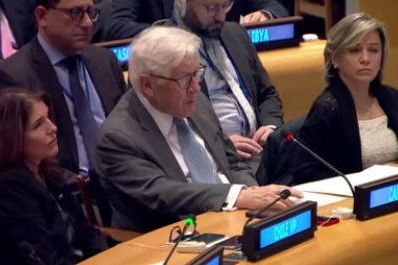
The Islamic Republic was voted out from the United Nations Commission on the Status of Women (CSW) for policies contrary to the rights of women and girls.

The Islamic Republic was voted out from the United Nations Commission on the Status of Women (CSW) for policies contrary to the rights of women and girls.
On Wednesday, members of the UN Economic and Social Council (ECOSOC) adopted a US-drafted resolution to "remove with immediate effect the Islamic Republic of Iran from the Commission on the Status of Women for the remainder of its 2022-2026 term" over the regime’s bloody crackdown on protests ignited by the death of a young woman in custody of hijab – or the so-called “morality” -- police.
“This vote is another sign of the growing international consensus on Iran and demands for accountability,” US National Security Advisor Jake Sullivan said after the vote.
The Commission on the Status of Women (CSW) is the principal global intergovernmental body exclusively dedicated to the promotion of gender equality and the empowerment of women.
Out of the 54-member body, 29 members voted in favor of the resolution while eight voted against and 16 countries abstained. The Islamic Republic itself, Palestine, Syria, Cuba, China, Russia, Eritrea, Belarus, Zimbabwe, and North Korea voted to keep Iran in the body.
The vote was the first time in United Nations history that a country was expelled from the commission.
It was the second step against the Islamic Republic’s violations of human rights during the current wave of protests. The first step by the United Nations to hold the Islamic Republic accountable for its crackdown on protesters was creating a fact-finding mission by the Human Rights Council. The Geneva-based UN Human Rights Council voted on November 24 to launch an independent investigation into the regime’s deadly repression of protests that has killed around 500 civilians, including about 60 children.
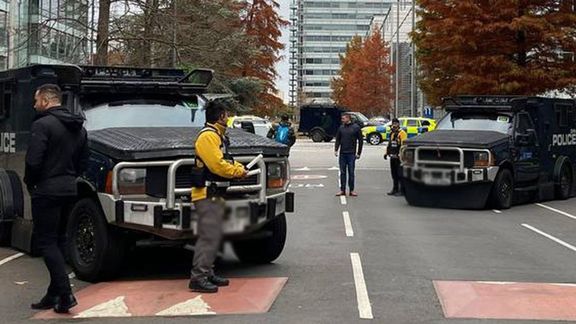
Amid repeated threats by the Islamic Republic against Iran International’s reporters, the UK has vowed to step up protection of London-based journalists.
British Foreign Minister James Cleverly said during a session at the parliament on Tuesday that the Foreign and Commonwealth Development Office (FCDO), in partnership with the Home Office, had ensured that the Iranian journalists were protected by the British police.
“The UK remains absolutely determined to ensure that Iran does not intimidate people within this country. We will always stand up to the aggression from foreign nations,” he noted, adding, “We will absolutely not tolerate threats, particularly towards journalists who are highlighting what is going on in Iran, or indeed any other individual living in the UK.”
One day later, Iran’s Intelligence Minister Esmail Khatib in a television interview repeated threats to “punish all those” who had a role in popular protests against the regime, wherever they might be.
Khatib on November 9 had said the Islamic Republic regards Iran International as “a terrorist organization,” adding that its workers and anyone affiliated with the channel will be pursued by the Ministry of Intelligence all over the globe.
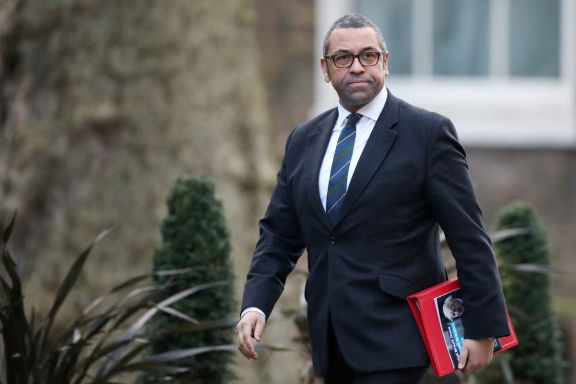
In November, Volant Media, the parent company of Iran International, said that two of its journalists had been notified of direct threats. It said in a statement the Metropolitan Police had formally notified both journalists that these threats represent an imminent, credible and significant risk to their lives and those of their families. Ken McCallum — the head of MI5, the UK’s domestic counter-intelligence and security agency -- said on November 16 that UK authorities have discovered at least 10 “potential threats” since January to “kidnap or even kill British or UK-based individuals perceived as enemies of the regime.”
Expressing the UK’s commitment to hold the Islamic Republic to account, Cleverly said, “These protests in Iran are a watershed moment. After years of repression, the Iranian people have clearly had enough. They are standing up to the authoritarian regime under which they live. Sadly, the regime has responded in the only way it knows: with violence.”
He went on to say the UK has imposed more than 300 sanctions -- including sanctioning the Islamic Revolutionary Guard in its entirety, adding “We will continue to work with partners to challenge the regime’s aggression at home and its disruptive behavior in the region.”
Declining to disclose plans to hit the Revolutionary Guards (IRGC) with further punitive measures after Iran International staff were given armed police protection, he said that it was “counterproductive to detail what future sanctions and designations might be brought in to ensure that the targets of those sanctions do not in any way try to evade the sanctions before they’re brought in”.
Also on Tuesday, UK security minister Tom Tugendhat said that Britain is facing growing interference, threats and influence from state actors including Iran, warning the “emerging era of state-based threats” poses “a challenge to our future and to our society” as well as to freedom of speech in the UK and residents' way of life. “They are threats not just to life — they are threats to our way of life,” he said at London-based think tank Policy Exchange.
The security minister said the Islamic regime’s crackdown on anyone it perceives as a threat to its authority had extended to Britain, noting that “Iran's malign behavior in the Middle East directly threatens our partners and our interests.”
“They are brutally suppressing courageous people in the streets who are calling for an end to the control of a corrupt and corrupted religious security elite claiming authority from God. All of this is clear, much of it has been clear for some time. What’s new is that we’re seeing this grow at home,” he said.
“Since Ken McCallum’s speech just a few weeks ago we’ve seen even more out of Iran,” Tugendhat said. “This is not and has not yet finished.”
Faced with nationwide antigovernment protests since mid-September, the Islamic Republic has blamed foreign-based Persian broadcasters such as BBC Persian and Iran International of “fomenting unrest”, while all media in the country are under tight government control and present protesters as “rioters” and “terrorists”.
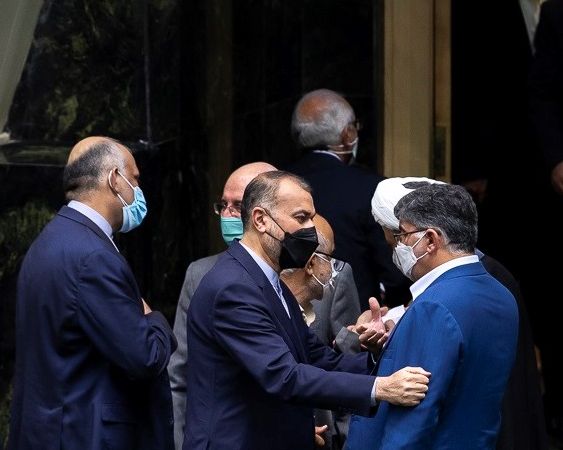
Scores of Iranian lawmakers have slammed what they call France's “interference” in Iran’s internal affairs after Paris condemned the execution of protesters.
In a statement on Wednesday, 194 members of Iranian parliamentarians condemned the recent solidarity of French lawmakers and senior officials, including President Emmanuel Macron and Foreign Minister Catherine Colonna with Iranian demonstrators.
According to IRNA News Agency, the MPs claimed the French officials’ recent remarks are “contrary to the principle of non-interference in the affairs of countries, which is one of the fundamental principles of international law and the principles included in the United Nations Charter.”
The statement also accuses the French president of “supporting the MEK leaders” saying he holds meetings with Iran’s “opposition groups who are officially seeking to overthrow the Islamic Republic.”
The Iranian lawmakers also alleged that Macron sends “his spies” into Iran to “disturb” the county’s national security by participating in “riots” and managing them.
Iran's parliament is packed with hardliners and many Revolutionary Guard officers.
Earlier, Paris summoned Iran’s charge d’affaires over the supply of weapons to Russia used in Ukraine and crackdown on protesters. FM Catherine Colonna told Reuters that the Iranian diplomat was also questioned over the treatment of seven French nationals who are currently in custody in Iran.
France’s foreign ministry on Monday also condemned the public execution of Majidreza Rahnavard who was sentenced to death following his participation in the protests currently under way in Iran.
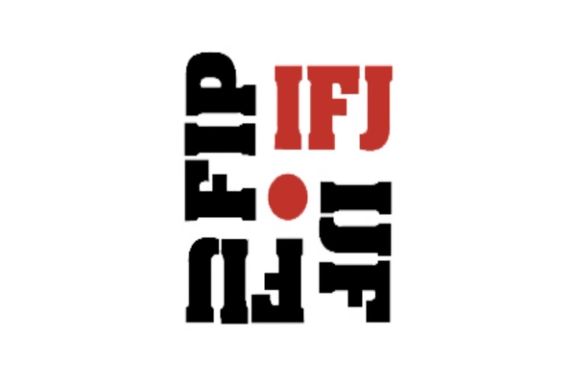
An international NGO says at least 57 journalists have been arrested in Iran since September during popular protests against the Islamic Republic.
The Brussels-based International Federation of Journalists said on Tuesday only 30 of the 57 detained journalists have been reportedly released so far.
According to the Federation, five journalists were serving their sentences in Iranian prisons before protests erupt following the death of Kurdish woman Mahsa Amini in police custody in mid-September.
In the past months, the International Federation of Journalists issued several statements calling on the Iranian authorities to end arrests of journalists and to release those imprisoned immediately.
Anthony Bellanger, Secretary General of the Federation of Journalists said, “We ask the Iranian authorities not to use the coverage of national protests as an excuse to suppress the media. Every citizen in Iran has the right to know what is going on.”
He went on to say that “Our colleagues should be released immediately and be allowed to report the events freely.”
“We remind the Iranian authorities that freedom of expression is a fundamental right of all Iranian citizens, including journalists,” underlined Bellanger.
Niloufar Hamedi, Elahe Mohammadi, and Ehsan Pirbornabash are among the journalists who are still in custody.
There are no exact figures on the number of people arrested during the protests, but some sources say nearly 20,000 people have been detained.

As the Islamic regime in Iran is executing protesters, some politicians in the system call for calm and urge the government not to resort to more violence.
Lawmaker Shahryar Haydari said in an interview that "the country cannot be controlled with military confrontations with protesters."
He added that the committee is reviewing the government's approach to offer its suggestions for a way out of the current crisis. However, he added that it is up to the Iranian Judiciary to decide who should be pardoned and who should be punished.
Haydari said the Judiciary should pardon all those who simply protested in the streets and did not engage in violence. Referring to the execution of two protesters in less than one week, the lawmaker suggested that the government should not follow policies that increase tensions in society.
He further claimed that there have been fewer protests in recent days, but the government should not think protesters have given up their demands. The government should listen to them and President Ebrahim Raisi should be personally accountable for all the problems in the country.
However, a hardliner lawmaker Mostafa Mirsalim said Wednesday that the Judiciary should execute protesters quickly - within ten days after their arrest.
Haydari, stressing that military confrontation with the protests cannot solve the country's problems, called for economic solutions for the people's financial problems.
But that is one goal Raisi cannot accomplish by himself without a major change in foreign and domestic policies, a herculean task hinging on support by the authoritarian ruler Ali Khamenei.

Meanwhile, reformist sociologist and political activist Hamid Reza Jalaeipour said in an interview with Etemad Online that "Protests have still not entered a revolutionary phase, but they will, if the situation becomes increasingly critical. He added that the execution of a young protester, Mohsen Shekari on December 8 has deeply moved and agitated even those Iranians who were not actively taking part in the protests.
Jalaeipour said that most of those protesting in the streets are women and young Iranians including students. Nonetheless, he added, around 70 percent of Iranians are still silent and have not aligned with the opposition although they are not happy with the government's performance.
He pointed out that what is happening in Iran is not a riot. "Riots end soon but this movement is continuing. It has so many artistic and cultural manifestations and it has attracted worldwide support," Jalaipour said, and added that the government should allow these demands to be voiced. But unfortunately, the more politically active the society becomes, the less openness the government shows.
"During the past 90 days while this movement has been going on, the government has not tried to convince the people that it cares for their views. If this approach continues…a revolutionary phase might start," he said, adding that "The government has managed to control the situation during the past three months, but it cost hundreds of lives."
Jalaeipour added that some of the five million elders in the country are looking for conservative solutions. But this country has about 20 million youths and some 38 million others in between the two groups. The ideologically minded elders control the government regardless of what the other 58 million want. If they feel really fed up, they might end their silence.
Meanwhile, reformist politician Mehdi Ayati told Rouydad24 that if the government uses more violence against protesters, street unrest might go underground. He stressed: "Violence is not the right answer to [protests.]"
Although it might be too late, people will be happy when the government takes their demands and views seriously. But it has ignored the public’s demands and views for a long time. It should have attended to the needs of young people and women earlier.
Ayati, a former lawmaker, said that if the government wants to make up for its shortcomings, the first step is to avoid violence. He warned that violence will boost dissent to an uncontrollable level.

Iran’s Judiciary says 400 people have been sentenced to prison terms of between 2 to 10 years for participation in Tehran protests during the uprising against the regime.
“In hearings on cases of rioters in Tehran province, 160 people were sentenced to between five to 10 years in prison, 80 people to two to five years and 160 people up to two years,” Tehran’s judiciary chief Ali Alghasi-Mehr said Tuesday.
He also noted that 70 people have been fined without giving further details.
This comes a day after the regime hanged the second protester charging him with killing two members of security forces.
The Islamic Republic announced Monday that Majidreza Rahnavard, 23, had been executed in public in the north-eastern religious city of Mashhad.
Mohsen Shekari was the first protester hanged on December 8. The 23-year-old man was accused by the judiciary of just blocking a street and injuring a Basij militia.
Meanwhile, the number of people killed by security forces during the protest movement since mid-September has risen to 493.
The US-based Human Rights Activists News Agency (HRANA) announced in its latest report that from September 17 until Tuesday, December 13, at least 493 protestors have been killed, of which at least 68 were minors.
While the Islamic Republic has not provided accurate figures of those detained in the recent protests, the watchdog went on to say that at least 18,424 protesters have been arrested including 632 students.